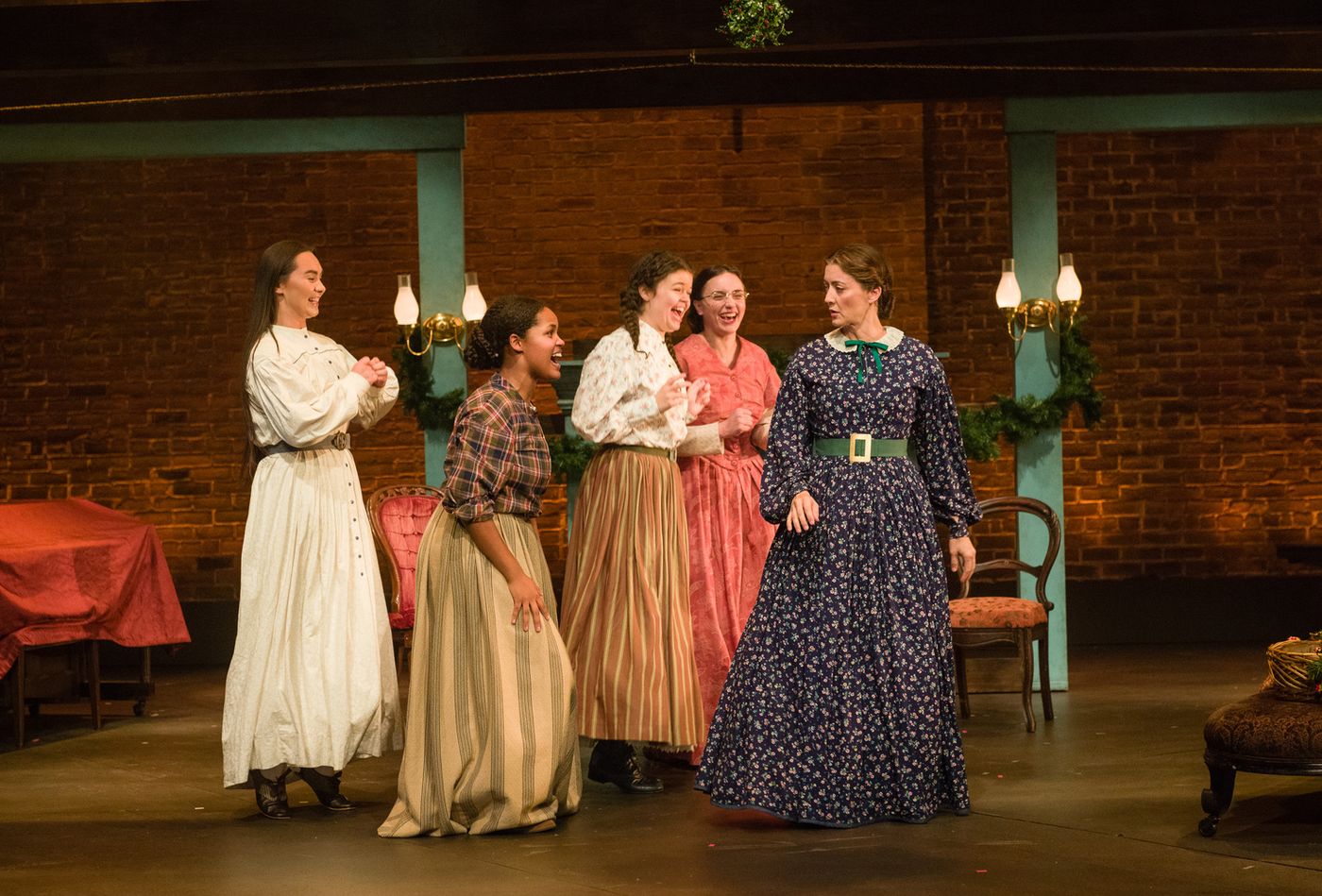Review: World Premiere Adaptation of LITTLE WOMEN at Jungle Theater

For the opening of her third season as Artistic Director at Minneapolis' spunky Jungle Theater, Sarah Rasmussen and her team commissioned a new adaptation of LITTLE WOMEN from Kate Hamill in celebration of the 150th anniversary of the novel's publication. Kate Hamill is an actor who has, of late, gained notice for her skillful adaptations of classic novels for the stage (several Austen works, Vanity Fair, etc.), to the point that she was one of the 10 most frequently produced playwrights in the US last season.
Many readers-including Patti Smith, Barbara Kingsolver, J.K. Rowling, Maxine Hong Kingston, Amy Bloom, and Anna Quindlen, according to a reflection published in the New York Times this week-savored LITTLE WOMEN when they first read it, often for the deliciously transgressive character of Jo March, one of the four March sisters. The girls are growing up in a household headed by their beloved mother Marmee while their father is serving as a chaplain with the Union army in the Civil War. Jo is passionate and outspoken and can little abide ladylike conventions; she is fiercely ambitious on her own behalf and wants to be a writer. It's common to speculate that she is based on Louisa May Alcott, the writer, herself.
In this adaptation, Hamill has chosen to foreground Jo's sense of her true self as inconsistent with the gender expectations of her time. Most obviously, Jo prefers pants to dresses, and it's clear she feels herself to be more boy than girl. Hamill presents the friendship that grows between Jo and the wealthier but orphaned neighbor boy Laurence, known as Laurie, as initially grounded in their shared rejection of gender norms. She also chooses to end this script well before the end of the novel, essentially at the death of Beth, the sensitive and sickly sister, known as the conscience of the family. (This neatly avoids the compromises of the final chapters of the novel, when Jo marries an older man. Alcott remained single throughout her life.)
It's essential to LITTLE WOMEN that the four girls be distinct individuals. The Jungle casting is spot on. As Jo, C. Michael Menge is engaging, fully capable of holding center stage, and bold and vulnerable by turns. Isabella Star Lablanck as Beth is ethereal and shy without ever being cloying; her portrayal is a far cry from the fierce goalie she played last season in WOLVES. This is an actor with range. The oldest sister, Meg, brings a tender maturity to her more conventional role, and then nails a terrific, desperate monologue in Act 2, after she's married and at the end of her tether caring for twin babies. (Anyone looking for new audition material should hunt this up!) In the most thankless of the roles, Megan Burns inhabits bratty baby sister Amy, whining and sulking and providing the essential personal antagonist to Jo. Burns also suggests that Amy is growing out of her self-centeredness as the play moves to a close.
Michael Hanna as Laurie morphs from awkward youth to plausible heart throb, with relatively little stage time in which to accomplish this. James Rodríguez manages to convince us that he sees and loves Meg for who she is. The older generation is played by gifted stalwarts of Twin Cities stages, largely underutilized here but deft: Christina Baldwin's Marmee can speak volumes with a look; Jim Lichtscheidl does justice to the complex personality of Laurie's wealthy grandfather; and Wendy Lehr sharply delineates three elderly ladies with distinct class differences.
Staged fluidly by Rasmussen, with movement help from Lichtscheidl, the show runs two and a quarter hours with one intermission. Chelsea Warren's set is simple, spare, and serviceable: a turntable renders time lapses and transitions theatrical, and a rear curtain made of quilt tops, easily shifted by the actors, provides varying looks. Rebecca Bernstein's unfussy costumes convey that the March family members are practical working class people of their time.
Original music by Robert Elhai does a great deal to enhance the atmosphere. Some is yearning fiddle music played live by Tyson Forbes who haunts the perimeter of the set in transitions. (Though uncredited in the program, Forbes also plays the wordless and wounded Mr. March.) The live music integrates seamlessly with recorded sound. Overall sound design is by Sean Healey.
With four strong roles for young women, this script is a worthy addition to the canon. It's clear that director Sarah Rasmussen is dedicated to the mission of the Bold Leadership Circle, a cohort of five Artistic Directors from around the country that she has recently been invited to join, committed to creating meaningful change for female artists. One aspect of that project is to grow the number of plays centered on women. Mining the classics is one route; giving full productions to new plays by and about contemporary women is another, like WOLVES from Jungles' last season. She also has initiated a playwriting mentorship program for teenage girls, called JungleWrites. Under Rasmussen's leadership, Jungle deserves both local audience support and national recognition for this culturally significant work.
Photo credit: Rich Ryan
Reader Reviews
Videos

